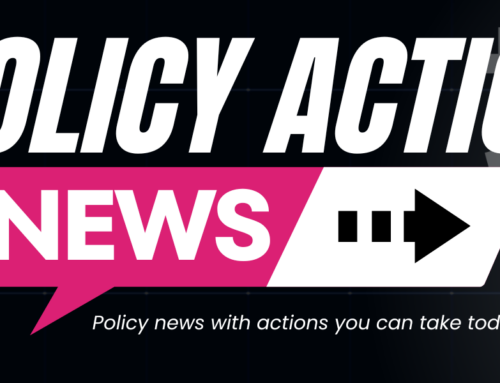As advocates around the world celebrated International Women’s Day, it was difficult not to remember that two mothers are killed in Gaza every hour. It was difficult not to remember that of the estimated 25,000 fatalities in Palestine, approximately 70% constitute women and children. It was difficult not to think of the utter lack of prenatal care, the C-sections being performed without anesthesia, and the 700,000 people enduring menstrual cycles without access to pads, toilets, and clean water.
And this is to say nothing of the long-term effects of the occupation on people’s ability to have and safely raise children. As the Palestinian Feminist Collective puts it, Palestinians are enduring a reproductive genocide. Freeing Palestine is, at its core, a reproductive justice issue.
Reproductive Justice is Gender Justice.
This genocide relies on the dehumanization of Palestinian women. In 2015, Ayelet Shaked was appointed Minister of Justice despite publicly calling for the slaughter of Palestinian women and the “little snakes” they give birth to. Today, Israeli soldiers have reportedly taken degrading photos of detained Palestinian women and uploaded them online. This pairs with the widespread practice of Israeli soldiers posing for pictures with the lingerie of Palestinian women they have displaced or killed in Gaza. These incidents are only small parts of a broad culture of dehumanization which has long served as the justification for violence against Palestinian women.
Since long before October 7th, Palestinian women have lived under the constant threat of arbitrary arrest and detention. Over the past three months, one hundred Palestinian women and children have been detained without formal charges by Israeli forces. UN special rapporteurs have uncovered and continue to investigate the barbaric treatment Palestinian women face in detention, which includes bodily assault, denial of food and medicine, and sexual violence.
Reproductive Justice is Racial Justice.
Racial justice is specifically and inexorably embedded in the framework of the reproductive justice movement. Centering the intersectionality of race, gender, sexuality, ability and class, the reproductive justice framework seeks to amplify and dismantle historical and present-day reproductive oppression and abuse in all communities, especially where Black, Indigenous and communities of color live. Since October 7, 2023, Palestinians in Gaza have borne witness to tens of thousands being killed at the hands of the Israel Defense Forces (IDF) and tens of thousands more have been injured because of the ongoing relentless attacks carried by the IDF. Israel has been accused of using starvation as a weapon of war, which is a war crime. About one quarter of the population is on the brink of famine and 21 people have died because of malnutrition and dehydration caused by Israeli authorities’ continued refusal to allow humanitarian aid from entering Gaza.
The practice of criminalizing Black and brown individuals in an effort to suppress their resistance to mass, state-sponsored violence is directly linked to white supremacy. Similarly, Palestinian families are separated by unjust incarceration, with over one million Palestinians arrested since 1967. Notably, two out of every five men have been arrested under military orders, deepening the painful separation of Palestinian families. It is not a coincidence that anti-Black policing practices in the US closely parallel IDF tactics of violent suppression and social control. American law enforcement officials are often sent to Israel for training or are trained by Israeli officials here in America. They are then trained on how to use more excessive force than they already do, they are instructed on how to carry out unlawful killings, and how to completely suppress freedom of expression and speech. In order to attain genuine reproductive and racial justice for Palestinian’s their lives must be valued, their bodies must be free from state control, and they must be fully humanized.
Reproductive Justice is Queer Liberation.
While grieving the loss of their families and homes, Queer Palestinians have had to shoulder the additional burden of fighting against pinkwashing. Pinkwashing is a term coined by Palestinian activists to describe the ways the Israeli government distracts from its human rights violations in Palestine by pushing the narrative that Israel is a haven for LGBTQ+ people. However, this is a false narrative. Queer and trans Palestinians seeking asylum in Israel report that they continue to face structural control and repression at the hands of local authorities. Furthermore, the IDF has a documented history of blackmailing queer Palestinians for military intelligence.
In November, an IDF soldier posted a photo of himself raising a rainbow flag amongst the ruins of a decimated neighborhood in Gaza. The flag read “In The Name of Love.” The image demonstrates the deadly consequences of pinkwashing, and of the obfuscation of Israel’s numerous crimes against queer Palestinians. As queer Palestinian activists have rightly proclaimed, there is no pride in genocide.
PWN reiterates our call for an immediate and permanent ceasefire.
Despite the relentless efforts that have been made by many to secure a permanent ceasefire, this genocide persists. It is important now more than ever to keep mobilizing, attending and actively participating in protests, amplifying information on social media, and refusing to look away!
As these events unfold, there has been a marked rise in Islamophobia, anti-Arab racism, and antisemitism. PWN condemns this bigotry and urges communities to look out for each other in these times.
The U.S. Campaign for Palestinian Rights has put together a toolkit that can help with each action item to ensure we continue to demand a permanent ceasefire. Additionally, Queers for Liberation have organized a petition for LGBTQ+ organizations to demand a permanent ceasefire! It is imperative that we do not lose hope so that we may all witness a free Palestine in our lifetime!
“My sister, our land has a throbbing heart, it doesn’t cease to beat, and it endures the unendurable. It keeps the secrets of hills and wombs. This land sprouting with spikes and palms is also the land that gives birth to a freedom-fighter. This land, my sister, is a woman.”- Fadwa Tuqan, from Hamza



